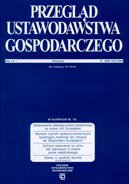The tenderer's status in the public procurement procedure
The purpose of the study is to analyze the status of the tenderer under the Public Procurement Law, in particular: determining the temporal limits of this status, the rights and obligations of the entity entitled to this status, and to examine the internal dynamics in the group of tenderers. In a public procurement procedure based on a tender model, three stages can be distinguished: pre-bid, bid and pre-contract. Article 7.30 of the Public Procurement Law enables the identification of four categories of economic operators, only two of which refer to participants in the procedure. The status of the candidate is linked to the pre-bid phase of the procedure, while the status of the tenderer is activated with the start of the bidding phase, and ends with the completion of the pre-contractual phase i.e. the award of the contract. The composition of the group of bidders as well as their rights and obligations are changed when the result of the procedure announced by the contracting authority becomes final. While at the bidding stage, tenderers have the right to actively act to maintain their offer in the proceedings or eliminate competitors' offers, at the pre-contractual stage, nonselected contractors can only wait for the reactivation of the bidding stage, which may happen if the tenderer whose offer has been selected refuses to conclude the contract.
References
Bibliografia/References
Boratyńska, M. (2001). Przetarg w prawie polskim. Zagadnienia cywilistyczne. Dom Wydawniczy ABC.
Dzierżanowski, W., Jerzykowski, J., & Stachowiak, M. (2018). Prawo zamówień publicznych. Komentarz. Wolters Kluwer.
Gordon, Z. (2012). Charakter prawny postępowania o udzielenie zamówienia publicznego. Prawo zamówień publicznych. (3), 30–40.
Gordon, Z. (2018). Konsekwencje poprzetargowego obowiązku zawarcia umowy w sprawie zamówienia publicznego. Prawo Zamówień Publicznych, (1), 17–27.
Hartung, W., Bagłaj, M., Michalczyk, T., Wojciechowski, M., Krysa, J., & Kuźma, K. (2015). Dyrektywa 2014/24/UE sprawie zamówień publicznych. Komentarz. C.H.Beck.
Horubski, K. (2008). Odpowiedzialność odszkodowawcza zamawiającego za naruszenie reguł udzielania zamówień publicznych. Przegląd Prawa Handlowego, (1), 44–50.
Lubiszewski, M. (2021a). Skutki upływu terminu związania ofertą w świetle przepisów nowego Prawa zamówień publicznych. Przegląd Ustawodawstwa Gospodarczego, (4), 44–49. https://doi.org/10.33226/0137-5490.2021.4.6
Lubiszewski, M. (2021b). Upływ terminu związania ofertą a zwrot wadium w świetle Prawa zamówień publicznych. Studia Iuridica Toruniensia, (XXIX), 177–192. https://doi.org/10.12775/SIT.2021.028
Moras, M. (2021). Konsekwencje uchylania się od obowiązku zawarcia umowy o zamówienie publiczne — wybrane zagadnienia. Studia Prawnoustrojowe, (54), 423–438. https://doi.org/10.31648/sp.6901
Nowicki, J. E., & Kołecki, M. (2019). Prawo zamówień publicznych. Komentarz. Wolters Kluwer.
Skubiszak-Kalinowska, I., & Wiktorowska, E. (2017). Prawo zamówień publicznych. Komentarz. Wolters Kluwer.
Sołtysińska, A., & Talago-Sławoj, H. (2016). Europejskie prawo zamówień publicznych. Komentarz. Wolters Kluwer.
Szostak, R. (2005). Przetarg nieograniczony na zamówienie publiczne. Zagadnienia konstrukcyjne. Wydawnictwo Akademii Ekonomicznej w Krakowie.
Szostak, R. (2018). Umowy o zamówienia publiczne w zarysie. Urząd Zamówień Publicznych.

